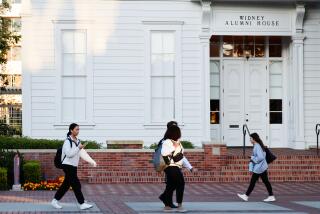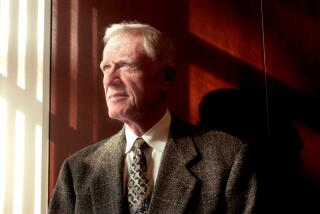Dr. Max Harry Weil dies at 84: pioneer in critical care
Dr. Max Harry Weil, an influential pioneer of critical-care medicine and the founding president of the Weil Institute of Critical Care Medicine in Rancho Mirage, has died. He was 84.
Weil died of prostate cancer July 29 at his home in Rancho Mirage, said his daughter, Dr. Susan Weil.
The Swiss-born Weil was known as one of the world’s leading clinicians, educators and researchers in critical-care medicine, a multidisciplinary specialty dealing with the care and treatment of the most acutely ill and injured patients.
“He developed this specialty, and he’s regarded worldwide as the father of critical care medicine,” said Dr. Wanchun Tang, president and chief executive officer of the nonprofit research and education institute.
“He believed very strongly that we should be able to save more lives,” Tang said. “That’s what he was working his whole life to do.”
Weil, who was on the faculty at USC from 1958 to 1981, was founding president of the Society of Critical Care Medicine in the early 1970s.
“He was among a small group of physicians who recognized that caring for the sickest patients required a change in the way care was delivered,” said Dr. Clifford S. Deutschman, the society’s president-elect and professor of anesthesiology and critical care at the University of Pennsylvania School of Medicine.
“He and his colleagues changed the way medicine is practiced,” said Deutschman, adding that Weil “almost certainly is the person who coined the phrase ‘critical-care medicine.’
“He was a great innovator, a great thinker and a great mentor. A lot of us got involved in critical care directly or indirectly because of him. He was a great role model.”
Weil and fellow cardiologist Dr. Herbert S. Shubin were faculty members at USC and on staff at Los Angeles County-USC Medical Center in 1958, when they began wondering why some patients died, especially at night, while apparently recovering from a heart attack, surgery or a serious illness.
“As they investigated that phenomenon, they realized if we had areas where we could monitor patients intensely to make earlier diagnoses and interventions we could save lives,” said Dr. Philip Lumb, professor and chairman of the department of anesthesiology at USC’s Keck School of Medicine. “They established a four-bedded ‘shock ward’” at Los Angeles County-USC Medical Center, “an intensive-care area so patients could be looked after 24 hours a day.
“That helped lay the foundation for what we currently call intensive-care units and the specialty of critical-care medicine.”
Weil and Shubin founded the Institute of Critical Care Medicine as a nonprofit public foundation at the USC School of Medicine in 1961; it was incorporated in the state of California in 1975.
Weil and Shubin created the first ward for critically ill patients at Hollywood Presbyterian Hospital in 1968.
Weil’s long list of accomplishments included being involved in the 1955 creation of the first bedside shock cart, a precursor to the code or crash cart of today, which holds lifesaving equipment and supplies.
He also was instrumental in introducing computerized patient monitors that measure a patient’s vital signs (1961) and computer-aided medical decision-making (1976), and he implemented the first “STAT” laboratory (1981), which provided quick lab results for the evaluation and treatment of critically ill patients in the ICU.
Weil was co-inventor of 25 U.S. patented medical devices and treatments, including a resuscitation blanket, a capnometer for measuring severity of shock and an automated chest compressor.
Through the institute, he trained more than 400 physicians and bioengineering fellows from around the world.
He received numerous awards and honors for his work, including the American Heart Assn.’s lifetime achievement award for contributions to emergency cardiovascular care.
In 2009, the World Federation of Societies of Intensive and Critical Care Medicine presented Weil with its first lifetime achievement award for his worldwide service to intensive care.
Weil retired as president of the institute in 2006. But, Tang said, he continued to work full time until two weeks before he died.
The son of German Jews, Weil was born Feb. 9, 1927, in Baden, Switzerland, where his businessman father worked for several years before the family moved to Stuttgart, Germany.
His family emigrated to the United States in 1937 and settled in New York City. After a stint in the Army Corps of Engineers, he earned his bachelor’s degree at the University of Michigan.
He received his medical degree in 1952 from State University of New York Downstate Medical Center in Brooklyn. He received a doctorate in physiology from the Mayo Clinic in Rochester, Minn., in 1957 before moving to Los Angeles.
In 1955, Weil married Marianne Posner; they later separated. Weil shared the later part of his life with Margery Stone, who died in 2008.
He is survived by his wife; his daughters, Dr. Susan Weil and Carol Weil; and four granddaughters.
More to Read
Start your day right
Sign up for Essential California for the L.A. Times biggest news, features and recommendations in your inbox six days a week.
You may occasionally receive promotional content from the Los Angeles Times.




















































